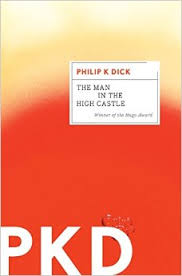 Philip K. Dick, The Man in the High Castle (Boston: Mariner Books, 2011). Paperback | Kindle
Philip K. Dick, The Man in the High Castle (Boston: Mariner Books, 2011). Paperback | Kindle
One night, with nothing better to do, I scrolled through Amazon Instant Video looking for something to watch. I came across The Man in the High Castle (an Amazon Original Series). The premise of the show is that the U.S.A. lost World War II and is now divided between the Germans on the East Coast and the Japanese on the West, with a small neutral zone along the Rocky Mountains. The pilot was well done, but it is the only episode released so far. Learning that the series was based on Philip K. Dick’s novel of the same name, I ordered the book (from Amazon, of course) and started watching.
Three things: First, the show is nothing like the book. Second, the book is much better than the show. (In my experience, the book is always better than the movie or TV show, even when the latter is good.) Third, I am embarrassed to confess that it has taken me 46 years to read this author.
For those of you who are similarly uninformed, Philip K. Dick is a Hugo Award-winning science fiction author. (Indeed, he won the Hugo Award—science fiction’s most prestigious—for The Man in the High Castle.) Even if you have not read his books or stories, you are probably familiar with them, for several have been turned into blockbuster films: Blade Runner (based on the novel, Do Androids Dream of Electric Sheep?), Total Recall (based on the story, “We Can Remember It for You Wholesale”), Minority Report (based on the story, “The Minority Report”), and The Adjustment Bureau (based on the story, “Adjustment Team”).
But back to The Man in the High Castle. As noted above, the Axis Powers won World War II and divided the world between them. The Nazis completed the Holocaust, pushed the Slavs back into Asia, and perpetrated continent-wide genocide in Africa. They also developed their technological capabilities to such a degree that they are beginning to colonize Mars. Japan, by contrast, took control of the American West and the Latin American South. They have not developed their technological capabilities. Indeed, their culture is suffused with Buddhist mysticism, and—weirdly—a fanatical love for Americana. They are not as extremist as the Nazis, nor as powerful, but they are still clearly in control within their sphere of influence.
The Man in the High Castle centers on the interactions of several German, Japanese, and American characters. Unlike in the TV show, there is no revolution in the offing. There is plenty of intrigue, however, with espionage, assassination, and counterfeiting all playing a role. As I read it, the novel—if its narrative can be reduced to abstract ideas—is about authenticity, choice, and reality.
Who the characters are and who they present themselves to be are not identical. There’s a lot of subterfuge and disguise (more emotional than physical). Key points in the novel turn on characters making choices to more closely align their self-presentation with their inward self. And there are moments—especially toward the end—when it’s unclear what the reality of the situation is, whether reality itself depends on choices made. One of the subplots involves a character seeking out the author of The Grasshopper Lies Heavy, an alternate history novel in which the Allies defeat the Axis in World War II, though in a way unlike the historical ending of World War II. In other words, The Man in the High Castle is an alternate history with a subplot about an alternate history. The ending leaves open the question which alternate history is real within the world of the novel.
In some ways, this ambiguity makes for a dissatisfying ending to the book. In other ways, however, it leaves open possibilities for choice and action, which I think was the author’s point. If you like neat story lines with clean endings, don’t read The Man in the High Castle. If you’re okay with thought-provoking ambiguity, however, take and read…
—–
P.S. If you found my review helpful, please vote “Yes” on my Amazon.com review page.

